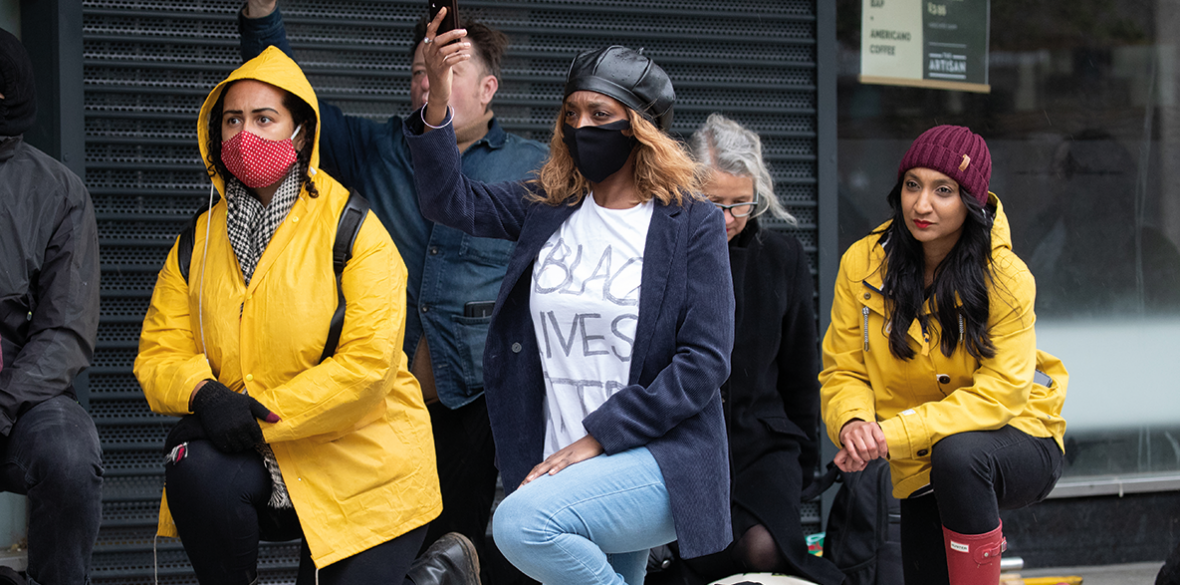This is the last article you can read this month
You can read more article this month
You can read more articles this month
Sorry your limit is up for this month
Reset on:
Please help support the Morning Star by subscribing here
IN COMMON with much of the last year, October is a prime month for tokenistic gestures.
It is a month when some white people who for the rest of the time treat black people with contempt turn up for their annual dose of black history and food.
Some are even invited to make a speech or two to underline their “against racism” credentials and to say how much they believe that black lives matter.
If I sound cynical it’s because I am. I have had enough of the fakery from the I’ve spent my whole life fighting racism/my best friend is black/I haven’t got a racist bone in my body brigade.
The same people who asserted how important it was to turn the Black Lives Matter uprising from a moment into a movement — but only, in reality, if it didn’t have an impact on them.
I have said in these pages before that these attitudes are not in my experience confined to the political right. There are many across the trade union and labour movement who also need to take a cold hard look at themselves.
That’s why the work of the TUC Task Force against Racism is so important. As we await (impatiently) for the Labour Party to say something meaningful about anti-black racism — or even just to publish the long overdue Forde report — the work of the TUC task force takes on an added significance.
I must declare an interest — and not just as a black worker eagerly awaiting the outcome. A generation ago I was the secretary of the TUC Stephen Lawrence Task Force into institutional racism.
Until recently I chaired one of the latest task force workstreams on organising as a TUC general council member. In more ways than one I literally have skin in the game.
I am going to make a few suggestions for outcomes that I believe might begin to make a difference for black workers because, to be blunt, we really need the trade union movement to do better than it is doing.
Many trade unions will only be able to provide an estimate of how many black members they have, where they are and what they are doing.
This is a basic ask of employers — or at least it should be — so it should be our starting point too. Let’s identify our numbers and where we are and get employers to do the same.
Once we know how many black members there are then unions should be setting out targets for the involvement of black members at all levels and not just within the confines of reserved seats.
But Roger, I hear you say, haven’t you been talking about black self-organisation for years? Are you saying we don’t need that now? No. I think we need more and real black self-organisation across the movement but it’s not the only place that black workers should be.
We should be everywhere at all levels involved in everything.
If there are black people involved as activists — not “just” doing race equality work — then there is more of a base from which to recruit or elect more black union officers and staff.
Unions should therefore be setting clear targets for the employment of black staff at all levels and held accountable for achieving them.
Each union should set out a clear anti-racist bargaining agenda and should be prepared to translate this agenda into industrial action if necessary.
In reality this will mean prioritising bringing services in-house because even anecdotally we know that many black workers — especially women — are trapped in low-paid private contractor areas or forced to become self-employed to get on the books of agencies.
Sector change across areas such as social care, where so many black workers are found, is therefore vital and that means prioritising what my comrade and experienced organiser Nigel Flanagan calls full spectrum organising, where all of the resources of the union are bought to bear to make a substantial and lasting difference.
In my view organising should be the priority. Many things can and have been said about me over the years but nobody can say I am not consistent about that point. However, where we can, we should make much better use of the law.
Far too many black workers continue to be disappointed with the inability of their unions to stand by them in claims of race discrimination.
So unions must move beyond this threshold of reasonable prospects for success before they agree to take on race discrimination cases.
This is the front line for many black workers. The reason many of us join unions. As far as many black workers are concerned not enough is being done.
We need to establish an actual zero-tolerance threshold against racism. This means being clear that regardless of your status within the movement you will be held to account for your racist attitudes and behaviour and the resources of your union will not be used to protect you and demonise the black victim.
I will write more about the task force in future columns. Unions need to be clear though that black workers will not accept a mealy-mouthed outcome to the task force. We need to see a demonstration that black lives actually do matter to trade unions beyond our continued subscriptions.
Roger McKenzie is general secretary of Liberation and a long-time union and anti-racist organiser.










